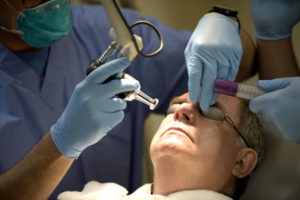
Highest Paying BSN Nursing Careers
The highest paid nursing specialties and careers include nurse practitioners, nurse midwives, and also nurse anesthesiologists. Nursing has traditionally been seen as a woman’s job, and like many such careers, pay for nurses has not always been high. That is changing today, as nurses take on more advanced roles once held by physicians.
Additionally some of the highest paid nursing jobs center on specializations like Pediatrics, Certified Midwifery, Psychiatry/Mental Health, Gerontology, and Critical Care. Many of the highest-paying nurse jobs, such as Nurse Practitioner, Nurse Anesthetist, or Nurse Administrator, require a Master of Science in Nursing (MSN) or a Doctor of Nursing Practice (DNP). The best nursing jobs require an advanced graduate-level degree and additional licensure, as well as the best nursing certifications.
Ranking the Highest Paid Nursing Careers
Because salary expectations vary so widely, it’s hard to accurately rank nursing careers. There are many variables including region, city, education, and experience. But to evaluate the highest-paying nursing careers, we took average salaries from reputable sources including Salary dot com, Payscale, Glassdoor, and the Bureau of Labor Statistics.
1. Neonatal Nurse Practitioner

When you are looking into the highest-paying nursing careers, you want to consider a neonatal nurse practitioner role. The job responsibilities of a neonatal nurse practitioner focus on providing care and treatment to newborn infants sometimes in neonatal intensive care units. Neonatal nurses handle a variety of health concerns that impact newborn babies that range from congenital heart conditions to low birth weight and premature birth. The educational standards that apply to a neonatal nurse practitioner are high. The nurse must obtain a master’s in nursing with a concentration in neonatology. They must also finish a two-year advanced practice neonatal nursing program and obtain a license as a nurse practitioner.
The income level for a neonatal nurse practitioner is relatively high in comparison to other roles. The position requires a high level of education, so the salary range reflects the specialized training. The salary range for the role is between $123,447 and $145,200 per year. And the average income for these nursing professionals is roughly $134,000 per year.
Average Salary: $134,298 (salary dot com)
What Does a Neonatal Nurse Do?
2. Psychiatric Nurse Practitioner

A Psychiatric Nurse Practitioner or Mental Health Nurse Practitioner works in the mental health field and focuses on providing the care patients need to address conditions like depression, anxiety, and bipolar disorder. The nurse may work with a psychiatrist to provide mental health care to patients. These mental health positions require a master’s degree in nursing with a specialization in psychiatry. Nurses must obtain a license as a nurse practitioner and a certification in nursing psychiatry.
The average pay for a psychiatric nurse practitioner is $115,800 per year. The salary range for the position is between $103,500 and $127,010 per year. Nurses can expect to earn more as they gain experience in their field and improve their qualifications. Salary may vary based on the state and locality.
Average Salary: $115,800 (salary dot com)
3. Oncology Nurse Practitioner
An oncology nurse practitioner works with patients of every age who are going through cancer treatments and care. They assist medical doctors with cancer treatments and may focus on identifying and addressing concerns that arise during cancer treatment. They may also provide medications or assist with the use of treatments in various settings. The educational standards for an oncology nurse practitioner vary based on the goals of the nurse. Generally, a nurse must have a master’s degree in nursing with a concentration in oncology; however, some roles may require a doctoral degree. Research positions often require a doctorate. Nurses may also obtain certification.
An oncology NP earns roughly $121,000 per year. The salary range is between $114,810 and $126,389 per year. Exact salary ranges may vary slightly based on whether a nurse pursues clinical or research positions. It may also vary based on location and experience.
Average Salary: $121,900 (salary dot com)
4. Orthopedic Nurse Practitioner

An Orthopedic Nurse Practitioner is a professional who focuses on the musculoskeletal system. The specialized area of nursing addresses diseases or conditions that may impact the muscles or the skeleton of the patient. They may treat deformations, illnesses, injuries, or genetic conditions that impact the muscles, skeleton, ligaments, or tendons of the body. Orthopedic Nurse Practitioners must obtain a master’s degree in nursing and a license as a nurse practitioner before moving forward with their career. After gaining two years of experience as a nurse, it is possible to obtain certification for the specialized role and start working as an Orthopedic NP.
The salary potential for an orthopedic nurse practitioner depends on education level and experience. However, most Orthopedic Nurse Practitioners earn an average salary of around $122,100 per year. The salary range is between $114,000 and $129,800 per year. The salary range may vary based on the state and a nurse’s experience.
Average Salary: $122,100 (salary dot com)
5. Cardiac Vascular Nurse Practitioner

A cardiac vascular nurse practitioner works with cardiologists to provide patients with treatment for heart conditions. The nurse practitioner may focus on specialized aspects of heart health and work in a lab environment or a clinical environment. They help medical doctors with patient care and may provide rehabilitative treatments for patients after a heart attack or related heart condition. The position requires a master’s degree or higher, as well as a license to practice. Some positions may also require additional certification, though exact standards may vary slightly for each medical facility.
The salary expectations for a cardiac vascular nurse practitioner are higher than average for many nursing roles. You can expect to make between $105,000 and $131,000 per year. The average salary is around $123,000 per year for professionals working in a clinical or surgical setting. Keep in mind that your salary may change over time as you gain experience.
Average Salary: $75,172 for a Cardiovascular Nurse (salary dot com) and $123,270 for a Cardiac Nurse Practitioner (NP) (salary dot com).
What Is a Certified Cardiac Nurse Practitioner?
6. Neuroscience Nurse

A Neuroscience Nurse or Neurologist Nurse works with medical doctors to treat conditions or disorders associated with the nervous system. They may work with patients who have epilepsy, spinal cord injuries, or Parkinson’s Disease. In some situations, they also work in rehabilitation to help patients who have had a stroke or severe injuries. The educational standards for a neuroscience nurse depend on an employer’s standards. In most cases, nurses need a bachelor’s degree and a license to practice nursing. Some employers may also require certification in neuroscience nursing.
The income levels for a neuroscience nurse depend on educational levels and an employer’s standards. The salary range for the role is between $71,000 and $125,000 per year. You can expect to make a reasonable income as you gain experience and continue working on your education. Nurses who obtain a master’s degree can expect a higher salary.
Average Salary: $68,526 (salary dot com)
What Is a Neuroscience Nursing Certification?
7. Gerontological Nurse Practitioner

Gerontological nurse practitioners work directly with adult patients from adolescents until old age. They are professionals who take on a role similar to a medical doctor and have the ability to prescribe medications, order tests, and provide care to patients based on their health and needs. They may work in a variety of settings that range from medical facilities and private practice offices to hospitals. The role of a gerontological nurse practitioner requires a minimum of a master’s degree in nursing and certification as a nurse practitioner.
The salary potential for an Adult Gerontology Nurse Practitioner (AGNP) varies widely based on location. The average salary is around $104,000 per year nationwide. The salary range is between $96,000 and $113,000 per year. Nurses can expect some variation due to the differences in states and localities, as well as variation based on experience as a nurse.
Average Salary: $104,117 (salary dot com)
8. Dermatology Certified Nurse Practitioner

A dermatology-certified nurse practitioner provides skin care treatments to patients based on their needs. The position may focus on identifying and treating skin cancer, injuries to the skin, skin diseases, or other concerns that may impact the skin. The nurse may work with patients before or after medical procedures or operations and also assist with cosmetic procedures. A nurse can start working under the supervision of a dermatologist while working on a master’s in nursing to become a nurse practitioner. The final step is certification in dermatology to gain specialized training in skin-related healthcare.
The potential salary for a dermatology-certified nurse practitioner is high. The average salary is around $95,000 per year. The salary range is between $75,000 and $125,000 per year. Salary potential increases as nurses obtain certification and add to their credentials with continuing education. You may also increase your salary over time as you gain experience in dermatological treatments and patient care.
Average Salary: $95,000
What is a Dermatology Nurse Salary?
9. Women’s Health Nurse

A women’s health nurse works on conditions that impact the health and well-being of women. They specialize in treatments that may relate to female reproductive organs, family planning, and prenatal care. They also help women through childbirth and postpartum care and sometimes help deliver babies. The position requires a master’s degree or higher, as well as a license as a nurse practitioner and certification. Nurses may provide care to patients without the supervision of a doctor in some states.
A women’s health nurse can expect an average salary of roughly $90,000 per year. The salary range is around $71,000 and $111,000 per year. Nurses should expect some variation in salary based on their location and level of education. Nurses with a doctorate can expect to earn more when compared to nurses with a master’s degree.
Average Salary: $90,000
10. Gastroenterology Nurse
A gastroenterology nurse is a specialized position that focuses on the gastrointestinal or GI tract. The nurses provide treatment to patients who may have health concerns related to their stomach and intestinal tract that range from cancers and Crohn’s Disease to more common concerns like allergies and acid reflux. They assist doctors with treatment and provide basic care to patients during recovery from treatment. Many medical facilities will hire a nurse without certification. However, a professional can also obtain certification to enhance personal qualifications.
The salary potential for a gastroenterology nurse may vary slightly based on whether a nurse obtains certification or starts working without additional training. A certified professional can expect to earn between $79,000 and $100,000 per year. Salary may be slightly lower for professionals who do not obtain certification. It is possible to enhance and increase salary potential with additional training and education, as well as experience.
Average Salary: $89,500
11. Pediatric Nurse
Pediatric nurses specialize in treating children from birth until they are young adults. The focus of treatment is preventative care and the management of acute or chronic conditions that develop as a child grows. A pediatric nurse is a registered nurse (RN) who specializes in the care of infants, children, and adolescents. They provide a variety of services to patients and their families, including health assessments, administering medications and treatments, educating parents, and providing emotional support.
A pediatric nurse practitioner (PNP) is an advanced practice registered nurse (APRN) who specializes in the care of infants, children, and adolescents. They are educated and trained to provide primary care services, including health assessments, diagnosis and treatment of acute and chronic illnesses, immunizations, and health promotion. They also collaborate with other healthcare professionals to provide comprehensive care for their patients.
The salary potential for a pediatric NP differs based on education level and location. The average salary for the nursing position is roughly $88,500 per year. The salary range for the position is between $71,000 and $111,000 per year. Nurse practitioners with a doctorate may obtain a higher salary due to their qualifications.
Average Salary: $88,500
12. Chief Nurse Executive

A nurse executive is an advanced leadership role in any medical facility and it focuses on organization, communication, and leadership. In some medical facilities, a nurse may obtain the title of Director of Nursing due to the focus on leadership. It is the highest level of leadership available to nurses in any medical setting. The position requires a master’s degree in nursing with a concentration on executive nurse leadership. It also requires a nurse to have a license to practice nursing and certification in executive nursing practice. Many executives move up from positions as nurse administrators or nurse managers.
- Nurse Executives – responsible for overall nursing operations
- Nurse Administrators – manage specific departments
- Nurse Managers – oversee day-to-day activities and staff
Nurse executives are leaders in a medical facility and can expect a reasonable salary due to their specialized skills and their role in a medical facility. The salary range for Chief Nursing Executives is between $215,400 and $293,100 per year. Exact salary expectations can vary based on locality, the size of the medical facility, and the experience of a nurse executive.
Average Salary: $252,000 (salary dot com)
13. Certified Nurse Anesthetist

A certified nurse anesthetist plays a critical role in surgery and medical treatments. The nurse is responsible for administering anesthesia to patients before a surgical procedure and ensuring the safety of patients in relation to anesthesia. They may also focus on pain relief for patients during recovery or before treatment begins. The educational standards set for a certified nurse anesthetist begin with their nursing degree. They must also earn a doctorate degree from an accredited nurse anesthesia educational program and pass a National Certification Exam to obtain certification as an anesthetist.
The salary expectations for a nurse anesthetist range from $143,870 to $227,160 per year. The average salary for the position is around $203,000 per year. You can expect some variation in salary potential based on your location and experience. Some medical facilities may offer higher salaries due to the high demand for services, so nurses should evaluate the location and potential of a position when obtaining a job as an anesthetist.
Average Salary: $203,090 per year (BLS)
14. Informatics Nurse

Advances in technology impact the role of nursing and an informatics nurse takes on the challenges of handling technological factors in nursing. They use information sciences and computers to compile and maintain data about patient health and medical systems. The goal of the role focuses on improving patient care and outcomes by incorporating technological tools and keeping up with advances in medical technology. Educational standards for the role require a master’s degree in nursing and additional training in informatics. Nurses must also obtain certification in informatics to start working in technical support roles as a nurse.
The salary potential as an informatics nurse is high when compared to other roles in nursing. The high demand for the position contributes to the salary potential, as well as the high requirements for education. The average salary for the role is around $75,000 per year. The range of salary is between $56,300 and $97,400 per year. States may offer variable income rates, so exact salaries may differ based on your locality.
Average Salary: $75,000
15. Certified Nephrology Nurse/NP

A certified nephrology nurse working as a nurse practitioner offers treatment to patients who have kidney-related health conditions. The nurses may assist medical doctors with treatments related to kidney disease or health concerns related to the kidneys. They may also perform dialysis and assist patients in a medical facility or their home. The educational standards for a certified nephrology nurse working as a nurse practitioner focus on developing specialized skills.
A certified nephrology nurse is among the highest paying nursing jobs. The average salary for nurses working in nephrology is roughly $74,000 per year. Since nurses can start working in the field with a bachelor’s degree to gain experience before becoming a nurse practitioner, income levels may increase over time with a higher level of education and more experience. A nurse may also take on leadership roles and management positions to increase his or her salary over time.
Average Salary: $74,000
16. Dialysis Nurse (Advanced Diabetes Management)

A dialysis nurse who specializes in advanced diabetes management and care focuses on providing the treatment that diabetic patients need for their long-term health. The nurse may work with a nephrology nurse practitioner to handle dialysis and medical treatments for kidney-related health conditions. They also work with diabetic patients to address underlying health concerns that may apply to the needs of patients with diabetes.
A dialysis nurse focusing on diabetes management has a reasonable salary for their level of education. The salary range for the role is between $54,500 and $86,600 per year. The salary falls in the middle at roughly $72,000 per year. You can expect some variation in salary potential based on your level of education, location, and experience. Nurses who obtain a master’s degree may earn more when compared to nurses who obtain a bachelor’s degree.
Average Salary: $72,000
How Much Does a Dialysis Nurse Make?
17. Occupational Health Nurse Practitioner

An occupational health nurse practitioner focuses on limiting the health risks associated with workplace environments. OHNs are also called environmental health nurses and may work in companies and settings where employees have a high risk of exposure to toxic materials, heavy machinery accidents, or other situations that may lead to injuries. Additionally, occupational health nurses help employers set up reasonable safety procedures and standards for their employees, and identify risk factors that may cause harm to potential employees. The position requires a master’s degree in nursing and certification in occupational health nursing.
Since occupational health nurse practitioners may work with private companies and corporations, salary potential varies significantly based on the needs of the company. The average salary for occupational health nurse jobs is around $72,000 per year. The salary range for occupational health nurse practitioners is between $53,000 and $89,000 per year. You can expect some variation based on your experience and location.
Average Salary: $72,500
18. Plastic/Reconstructive Surgery Nurse

Nurses who work with plastic surgeons or reconstructive surgeons focus on cosmetic procedures for patients. They may work with a surgeon to provide invasive treatments like surgery, laser treatments, or injections. They may also provide non-invasive treatments like microdermabrasion and chemical peels. Their specific responsibilities depend on the medical facility and the surgeon’s focus on treatment. A reconstructive surgery nurse must obtain an associate’s degree or higher, as well as a license. Some facilities may require a bachelor’s degree and certification in plastic surgery nursing.
The average salary for a plastic surgery nurse is roughly $69,200 per year. The salary range for the position is between $47,000 and $91,000 per year. Nurses with a higher level of education can expect to earn more when compared to nurses with an associate’s degree.
Average Salary: $69,200
19. Case Management Nurse

A case management nurse plays an important role in patient interaction with a medical facility. The role of a case management nurse is to use resources and services in a way that is fiscally responsible and ensures that a patient’s healthcare needs are met. You may work with insurance providers, physicians, and others in the medical field to provide quality care. In general, a case management nurse must have a degree in nursing and a license to practice. A bachelor’s degree is common for the role. Certification may also help with the position, but it is not necessary for all facilities.
Nurse case managers earn around $48,000 to $83,000 per year. The average salary for the position is around $64,000 per year. You can expect some variations in the salary potential based on your location. As you gain experience, you may notice that you earn more in your role as a case management nurse.
Average Salary: $64,000
20. Medical-Surgical Nurse

A medical-surgical nurse (med surg nurse) takes on an important role in the operating room during surgical procedures. The nurse works with a surgeon to address the needs of patients who may have rapid deterioration of their health due to injuries and ailments. They work in a fast-paced environment and may play a critical role in identifying and addressing emergency situations. The position requires nurses to obtain an associate’s degree or higher. In many facilities, a nurse must have a bachelor’s degree. After an internship with a medical-surgical team, a nurse may take on the role of a professional. Certification is available to nurses after two years of work experience.
The average salary for a medical-surgical nurse is around $62,500 per year. Since the position does allow nurses with an associate’s degree to take on the role in some states and localities, the range of incomes is variable. Medical-surgical nurses can earn between $36,500 and $92,300 per year. Obtaining certification and a bachelor’s degree will increase salary potential.
Average Salary: $62,500
21. Genetic Nurse

A genetic nurse is among the highest-paying nursing careers due to the complexity of the role. The nurse works with medical doctors to treat patients who have genetic health conditions or have a condition that has a genetic component that complicates treatment. The nurse may assess the role of genetics in a health condition and discuss the potential risk factors with a patient or a patient’s family. The role may also offer opportunities for research positions. Nurses who want to work as genetic nurses must obtain a master’s in nursing with a focus on genetic nursing. After gaining experience as a nurse, professionals may also qualify for advanced genetic nursing certification that allows them to take on complex roles in research or medical treatment.
A genetic nurse can expect a reasonable salary due to the high level of education and specialized training. The average salary for a genetic nurse is around $62,400 per year. The salary range for the position is between $43,400 and $92,200 per year. Nurses can expect to increase their income when obtaining certification or taking on a leadership role.
Average Salary: $62,400
22. Emergency Room Nurse (ER Nurse)

Emergency Room Nurses (ER Nurses) work in the fast-paced environment of an emergency room. They take on the challenges of working with patients in emergency situations who may be experiencing traumatic injuries and high-risk health concerns. An emergency room nurse must act quickly to handle the needs of patients and make decisions at a fast pace to address potential health risks. The educational requirements for an ER nurse may vary slightly based on the state and locality; however, most hospitals prefer to hire nurses with a bachelor’s degree in nursing. The hospital provides further training after a nurse obtains a license. Emergency Room Nurses can obtain further certification if they plan to continue working in an emergency room setting or want to enhance their skills.
Income levels for an ER nurse may vary widely due to the educational standards for the role. Hospitals may hire nurses with an associate’s degree as well as a bachelor’s degree in certain circumstances, so the exact salary potential differs for nurses. The salary range for an ER nurse is between $46,700 and $92,800 per year. The average salary for the position is roughly $62,000 per year. Nurses can expect to increase their salary as they gain experience or work on obtaining a higher level of education.
Annual Salary: $62,000
Trauma Nurse vs ER Nurse Job Description
23. Advanced Certified Hospice and Palliative Nurse

When you are looking into the highest paying nursing jobs, you want to consider working as a palliative nurse. The role of a palliative nurse with an advanced certification focuses on providing pain relief and quality care to individuals who are terminally ill. The goal of your role as an advanced certified hospice and palliative nurse is to relieve suffering until a patient passes away. After that point, you may spend time with the family of a patient offering bereavement and grief-related services. As a general rule, hospice nurses must have a bachelor’s degree in nursing as well as a nursing license and certification for the role.
Income levels for an advanced certified hospice and palliative nurse vary based on your level of experience, location, and education level. The average income for the role is around $61,000 per year. The salary range for the nursing position is between roughly $48,500 and $81,500 per year. You can expect some variation in your actual income as you gain experience in your field.
Annual Salary: $61,000
24. Pain Management Nurse

A pain management nurse works directly with patients who have chronic or acute pain. They specialize in pain management and may work with patients who have debilitating pain conditions. Pain management nurses may provide treatments that include the use of addictive pain medications, so they take measures to limit the risk of addiction or dependence while treating a patient. They may also use alternative treatments for pain like massage therapy or acupuncture. Nurses must obtain an associate’s degree or a bachelor’s degree and a license for the position. Many employers require a bachelor’s degree. After gaining experience as a registered nurse, it is possible to obtain certification in pain management nursing.
The average salary for a pain management nurse is roughly $60,000 per year. The salary range is between $28,000 and $78,000 per year. Nurses who obtain a higher level of education may also increase their salary potential to $101,000 per year. The exact income level depends on a nurse’s level of education and experience, as well as the locality.
Annual Salary: $60,000
25. Critical Care Nurse or ICU Nurse
A critical care nurse is a specialized nurse that treat patients suffering from critical illnesses or injured patients in an intensive care unit (ICU). Critical care nurses and ICU nurses are experts in assessing, diagnosing, and managing complex medical conditions and life-threatening illnesses. They provide both physical and emotional care to patients and their families. Critical care nurses use a variety of specialized techniques, such as advanced life support, to provide care. They also collaborate with other healthcare professionals to provide the best possible care to their patients. These medical professionals work in various healthcare settings. Some locations include urgent care clinics and ambulatory centers.
The average salary for an ICU Nurse or Critical Care Nurse ranges from $45,000 to $90,000 per year, depending on experience and location.
Average Salary: $57,500
Other Top Nursing Careers
Below are some other careers for BSN graduates or nurses with a master’s degree.
- Certified Nurse Midwives
- Clinical Nurse Specialist / Clinical Nurse Specialists
- General Nurse Practitioner / General Nurse Practitioners
- Operating Room Nurse / OR Nurse
- Nurse Researchers/ Nurse Researchers
- Travel Nurse / Travel Nurses
- Infection Control Nurse
- Nurse Educator
- Legal Nurse Consultant / Legal Nurse Consultants
How Do You Make More Money as a Nurse?
When candidates ask how to make more money in a career, the initial go-to answer is usually related to getting a degree or further education. In Nursing, education has a direct correlation with income potential. Nurses are in high demand, which means that an RN makes an average of $77,600 every year, according to the Bureau of Labor Statistics (BLS). With the need for nurses estimated to grow by 6% by 2031, the Master of Science in Nursing degree, particularly with specializations and certifications opens up career potential, mobility, and income potential.
Candidates can also use their education, certifications, and licensure as a stepping-off point for networking opportunities. That background and high level of experience is the preparatory field for movement into areas of greater responsibility within the current job-organization structure but for cross-industry and multi-faceted career opportunities. Growth in income potential can involve moving into management or supervisory positions or just rethinking and re-imagining the roles and responsibilities that were previously relegated to the Nursing field.
Why Do Nurse Practitioners Make So Much Money?
With a Master of Science in Nursing (MSN), as well as an RN license, a Nurse Practitioner is able to tap into a level on par with physicians, with autonomy that allows the nurse to provide primary health care services to patients. A Nurse Practitioner generally has oversight for exams, diagnosis, record-keeping, testing, and other specialty nursing services.
If you’re wondering about what kind of nurse makes the most money, the highest paying nursing jobs are NPs who focus on specialized areas. Beyond the General Nursing, Psychiatric, Family Medicine, and Gerontological specializations, the highest paying Nurse Practitioner jobs include areas of Anesthesiology, Pain Management, Critical Care, Education, and Administration.
Why is Nursing Specialization So Important?
The Nurse types and salary breakdowns are directly correlative as expected:
Non-Degree Nurses: Certified Nurse’s Aides (CNAs) and Licensed Practical Nurses (LPNs)
Nursing Assistants earn around $30,310 per year and these jobs are growing at around 5% (BLS). An LPN’s salary is $48,070 per year for nurses with a diploma in Practical Nursing. The BLS expects the number of jobs to grow by 6% in the next decade.
Degree Nurses: Registered Nurses (RNs)
With an Associate of Science in Nursing, RNs have a 6% growth potential (BLS), and a salary of $77,600 every year. Areas of most common specialization are Oncology, Pediatrics, or Acute Critical Care.
With a Bachelor of Science in Nursing, RNs are in higher demand. BSN prepared nurses also have a higher income potential and stronger job market opportunities. An estimated 55-60% of nurses have at least a BSN and that percentage is expected to climb to 80% since many states now require a BSN before newly licensed RNs can enter practice. The National Nursing Workforce Study also indicates that 50% of RNs are 50+ years old. Depending on the industry and specializations, an RN can earn a salary of $85,970 every year (BLS).
Advanced-Degree Nurses
These nursing career roles include Family Nurse Practitioner (NP), Certified Nurse Midwife (CNM), Clinical Nurse Leader (CNL), Clinical Nurse Specialist (CNS), Certified Registered Nurse Anesthetists (CRNAs), and Advance Practice Registered Nurses (APRNs). Specialized services and management roles often require a Master of Science in Nursing (MSN) as well as specializations.
Advanced practice registered nurses (APRNs) are some of the highest paid nurses. Like nurse practitioners and nurse anesthetists, they typically earn between $100,000 to $220,000 in annual compensation. And the job outlook for advanced practice nurses is strong. For example, the demand for Nurse Practitioners in particular is expected to grow by 46% through 2031 (BLS). And the median salary is $121,610 every year.
Nurse Educators earn a median salary of $78,580 per year in a clinical or academic environment. Administration positions can include Nurse Manager, Shift Leader, Healthcare Manager, and or Director of Nursing. Furthermore, the demand for administrative and leadership roles in nurses is expected to increase by 28% by 2031 (BLS). The median salary for these advanced-degree positions is $101,340 per year.
Salary Comparison for Nurses
These different types of nurses and salaries naturally offer a quick overview of the highest-paying nursing specialties. So, what are the highest-paying nursing careers? The answer is that the nursing jobs that will earn the highest salary every tend to require advanced education and education. Beyond the Master of Science in Nursing, there are additional nursing specialty certifications, the Post-master’s nursing certificates (PMC), that offer even more in-depth and specialized knowledge. This level of training can allow a Nurse Practitioner to become board-certified in specialized areas.
| Nurse Type | 2022 BLS US Median Annual Salary |
|---|---|
| CNAs | $35,760 per year (BLS) |
| LPNs | $54,620 per year (BLS) |
| RNs | $81,220 per year (BLS) |
| Nurse Educators | $78,580 per year (BLS) |
| Nurse Midwives | $120,880 per year (BLS) |
| Nurse Practitioners | $121,610 per year (BLS) |
| Nurse Anesthetists | $203,090 per year (BLS) |
Your Nursing Career
Nursing offers one of the most consistently in-demand and growing career trajectories available. Not only is there virtually unlimited room for growth and advancement, but the income potential and job security factors are solid. Nurses can and do travel nursing, work in the fields that mean the most to them, meet new people, and network to advance career objectives.
Related:
- Best Residential Accelerated BSN Programs
- 50 Best Nursing Jobs Based on Salary and Demand
- Top 25 Highest-Paying Cities for Nurses
- 10 Highest Paying States For Registered Nurses
- How to Become a CRNA Fast
- Top 20 Certified Registered Nurse Anesthetist (CRNA) Programs
- 15 Online Nurse Midwifery Programs
- 30 Best Online Master’s in Nursing Informatics Programs
- 10 Most Common Career Changes for Nurses
- How to Become a Diabetes Nurse Educator






